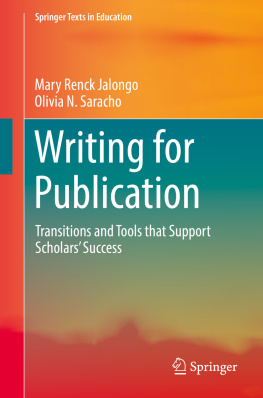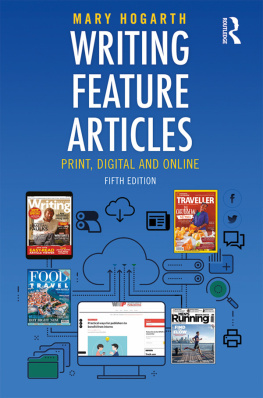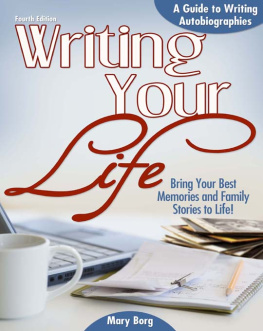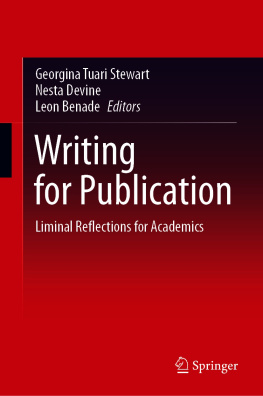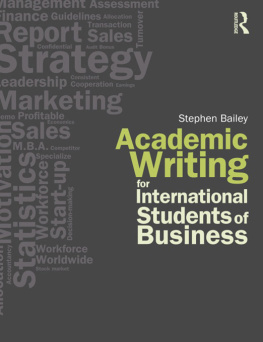Each year, a leading professional organization sends out a letter to authors who have contributed a book to their association publications. Tucked inside the envelope is a blue ribbon with the words book author stamped in gold capital letters; the top edge of the ribbon has an adhesive strip, suitable for affixing it to the conference name badge. At the annual conference, these ribbons frequently are flanked by others that read presenter or board member and they are just as eye-catching among academics as medals and ribbons are among military personnel. Yet even for these recognized and accomplished scholars, becoming a published author was once a faint, distant possibility. At one time, they were intimidated by the process, assumed that publishing was for reserved for intellectual giants of the discipline, and felt that they had little to offer by comparison. This chapter is all about more positive, productive ways of grappling with such misgivings by addressing the angst, risks, and rewards of scholarly writing. It begins by exploring understandings of what it means to be an academic authordefining the role and examining metaphors that capture the essence of the experience. It then turns to the rewards and challenges of writing for publication and the writing habits that support authors in overcoming obstacles. The chapter concludes with advice on working with a writing mentor and the types of reasoning that are necessary to advance thinking in a field.
Who Is an Author?
How is the word author defined? Originally, the word was used more generally; it meant anyone who was the originator of something: Websters 1828 Dictionary defined authorship as One who produces, creates, or brings into being. Over time, definitions of the word author have become much more sharply focused on written composition. The American Heritage Dictionary of the English Language online defines an author as: The original writer of a literary work. One who practices writing as a profession and adds to assume responsibility for the content of a published text. In Academia, authorship conforms to all of these meanings; it also becomes part of the job description for students and faculty. Yet writing something original for publication and taking responsibility for it can be a daunting task.
Many times the papers produced while an undergraduate could best be described as stringing pearls of wisdom that have been gleaned from other sources. While students are taught to cite those works appropriately, their assignments seldom reflect much in the way of original thought. Even at the masters level, there is understandably more emphasis on acquiring familiarity with leaders in the field than in generating something new. Many students, academics, and first time authors worry that they are pretenders who will be unmasked at some point.
Activity 1.1: Feeling Like a Fraud
Do you sometimes worry that your ignorance will be exposed? Many times, scholars seeking to publish fear that their performance on a task or in a particular situation will expose just how incompetent they are beneath the faade. These feelings are so commonplace that it has had a name since the 1970s: the imposter phenomenon (IP). Take the Clance IP Scale and get feedback on your responses by clicking on the arrow at http://www.gradpsychdigital.org/gradpsych/201311?folio=24&pg=26#pg26 . Read the article by Weir. What strategies did you get for addressing the IP as it relates to scholarly writing and publication?
As Brookfield () writes:
Writer. I knew the word did not apply to me; inside my head was chaos I could not untangle in my own words; I was only a cutter and a paster, a borrower, a fake. While real writers shaped form and content, I felt little more than a hopelessly tangled fullness where ideas should be. (p. 4)
Yet if scholars pursue the doctorate and higher education, the single, most important expectation for their writing is that it makes a contribution and advances thinking in the field. Little wonder, then, that so many doctoral candidates falter at the dissertation stage and university faculty members balk at the pressure to publish.
Metaphors for Academic Writing
Metaphors are a tool for capturing the essence of experience (Cameron, ), for example, used the metaphor of a voiced scarf to describe mentoring. Just as a scarf surrounds the wearer in warmth and offers protection from the elements, a mentor can help a protg to attempt new challenges and to avoid beginners mistakes. When the idea of voice is added to the scarf, we can visualize it close to the wearers ear, whispering encouragement, offering suggestions, or advising caution. This captivating metaphor conveys what the best mentors do for their protgs.
Effective metaphors can provide a fresh perspective, suggest similarities, offer insights on how to redefine a problem, and effectively communicate a complex idea to others (Hadani & Jaeger, ). Where academic authors are concerned, the metaphors that they choose to represent their writing process frequently encapsulate their major concerns. A doctoral candidate from the English Department chose a bulldozer at a landfill as her metaphor. She likened the process to grim determination, plowing through, rearranging heaps of ideas, and periodically backing up to bury useless material, with the warning beep sounding off the entire time.
Activity 1.2: Whats Your Metaphor for Writing?
The symbol that you choose to represent your image of self as writer speaks volumes about how you view experience the writing process. What, then, is your metaphor for writing? What is it about this metaphor that aligns with your writing experience?
In a focus group study of doctoral students conducted in the U.S., Canada, and Australia, doctoral students were invited to choose a metaphor to represent their writing process (Jalongo, Ebbeck, & Boyer, ) concluded that, because doctoral candidates generally are accustomed to getting positive feedback on papers, they struggled with constructive criticism of their written work. These graduate students had not yet learned that real colleagues read for one another, not to seek uncritical approval, but as way to strengthen the overall quality of the manuscript.
With time and experience, representations of the writing process often change as well. After the English major who once viewed writing like operating a bulldozer experienced success in academic writing, first by publishing an article in College Composition and Communication and later by transforming her qualitative dissertation into a university press book about women in Appalachia (Sohn, ), her bulldozer metaphor no longer pertained. As skills and confidence with professional writing are built, the process becomes less onerous and the metaphors, more positive. For example, a doctoral candidate who had successfully defended a dissertation now regarded writing as a prestigious membership, explaining that it was an honor and a pleasure to be able to share research with others. As authors begin to relax with the process more, play with ideas, and learn which instincts to trust, new metaphors emerge:

